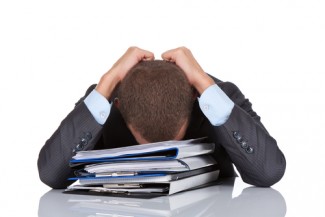Judges are stressed by their decisions, and 20% have at least one depressive symptom, survey finds

Image from Shutterstock.com.
One in five judges who responded to a survey on job stress met at least one criteria for depressive disorder, according to survey results released late last month.
The most common source of stress was the importance and impact of the decisions the judges are making, according to a study published in the 2020 Journal of the Professional Lawyer.
The National Judicial Stress and Resiliency Survey was designed by the ABA Commission on Lawyer Assistance Programs, according to an ABA press release. More than 1,000 judges responded to the survey, which was conducted before the COVID-19 pandemic.
Among the depressive disorder symptoms experienced by the judges were not having initiative (cited by 22.9%); being preoccupied with negative thoughts (20%); feeling work is no longer meaningful (17.8%); feeling they can’t wait for the day’s work to end (16.7%); and having a depressed mood (15.3%).
Just over 2% of the judges reported experiencing thoughts of self-injury or suicide. Writing in the 2020 Journal of the Professional Lawyer, the study authors called the finding very troubling. “While it is one of the lowest frequencies in this particular survey, it still reflects that 22 participating judges experienced thoughts of self-harm over the past 12 months,” the authors said.
Judges also said stress affected their energy (38.8%), sleep (36%) and concentration (32.3%).
The most frequent cause of stress related to the importance and impact of decisions, cited by 79.7%, followed by a heavy docket of cases, cited by 73.2%.
The next-most cited stress sources were unprepared lawyers (67.6%); self-represented litigants (62.5%); dealing repeatedly with the same parties without addressing the underlying issues (58.1%); a lack of public awareness about the courts (55.5%); long work hours without a break (53.5%); hearing contentious family law issues (50.3%); isolation in judicial service (50.3%); and insufficient staff support (49.5%).
To control their stress, judges most often turned to better nutrition, cited by 88.7%, and exercise, cited by 82.3%. Other popular choices were reading educational materials (77.3%) and social support from trusted people (76.6%).
The ABA Commission on Lawyer Assistance Programs initiated the study with its partners, the National Judicial College and the College of St. Scholastica. Among the recommendations: Leaders of courts and administrative agencies should demonstrate that judicial well-being is a priority; ensure access to well-being resources and programming; and authorize caseload and staffing studies.
The study also recommends that judges take steps to control their stress with good habits such as exercise, better sleep, good nutrition, stretching and relaxing movement, mindfulness and relationships with others.
A total of 1,034 of the nation’s 18,000 judges responded to the survey. About 80% are from state courts, while the others were mostly from local (10.1%) or state administrative (8%) levels. Only about 2% were federal judges.
ABA President Patricia Lee Refo said results of the “bold and comprehensive research” will help the ABA in its efforts to help judges protect their well-being. “This groundbreaking national research reveals that the stresses unique to judges can lead to health risks that interfere with their professional and personal lives,” Refo said in the press release.
The study authors said that in the months since the research was conducted, judges have been subjected to stress “like never before. We are facing a global pandemic, social change, economic challenges, the stress of a national election, and the impact of western wildfires, hurricanes and other natural disasters. Judges are engaged in the reconciliation of these issues from every perspective and in every way and there is no doubt it is having an impact.”
The study is titled Stress and Resiliency in the U.S. Judiciary. The study authors are College of St. Scholastica professor and forensic psychologist David Swenson; Joan Bibelhausen, the executive director of Minnesota’s Lawyers Concerned for Lawyers; Bree Buchanan, the 2017-20 chair of the ABA Commission on Lawyer Assistance Programs; retired Indiana judge David Shaheed; and Katheryn Yetter, academic director of the National Judicial College.



